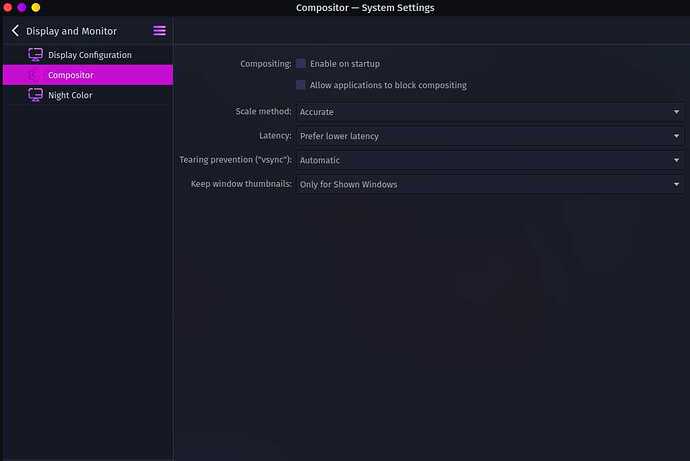I've tried doing some changes but I haven't modified much. I'm using Dragonized Gaming edition and the biggest change I can consider is turning off the taskbar dock zoom animation which gives it a vibe like mac. Now icon doesn't zoom up and follows just simple hover animation but this seems to help reduce the lag a little bit better.
I understand that having heavy transitions might be the cause of it but the thing is that I already have the decent config (shared below). So rendering shouldn't be the problem here? except if I'm lacking some sort of driver or etc. Hopefully below output will help pros here to find the cause here ![]()
System:
Kernel: 6.0.5-zen1-1-zen arch: x86_64 bits: 64 compiler: gcc v: 12.2.0
parameters: BOOT_IMAGE=/@/boot/vmlinuz-linux-zen
root=UUID=2724b483-ebe2-46f3-b250-be0931b048ce rw rootflags=subvol=@
quiet quiet splash rd.udev.log_priority=3 vt.global_cursor_default=0
loglevel=3
Desktop: KDE Plasma v: 5.26.2 tk: Qt v: 5.15.6 info: latte-dock
wm: kwin_x11 dm: SDDM Distro: Garuda Linux base: Arch Linux
Machine:
Type: Laptop System: ASUSTeK product: TUF Gaming FX505DY_FX505DY v: 1.0
serial: <filter>
Mobo: ASUSTeK model: FX505DY v: 1.0 serial: <filter>
UEFI: American Megatrends v: FX505DY.315 date: 03/09/2020
Battery:
ID-1: BAT0 charge: 34.9 Wh (100.0%) condition: 34.9/48.0 Wh (72.7%)
volts: 11.9 min: 11.9 model: ASUSTeK ASUS Battery type: Li-ion serial: N/A
status: not charging
CPU:
Info: model: AMD Ryzen 5 3550H with Radeon Vega Mobile Gfx socket: FP5
bits: 64 type: MT MCP arch: Zen/Zen+ note: check gen: 1 level: v3
note: check built: 2019 process: GF 12nm family: 0x17 (23)
model-id: 0x18 (24) stepping: 1 microcode: 0x8108102
Topology: cpus: 1x cores: 4 tpc: 2 threads: 8 smt: enabled cache:
L1: 384 KiB desc: d-4x32 KiB; i-4x64 KiB L2: 2 MiB desc: 4x512 KiB
L3: 4 MiB desc: 1x4 MiB
Speed (MHz): avg: 2100 min/max: 1400/2100 boost: enabled
base/boost: 2100/3700 scaling: driver: acpi-cpufreq governor: performance
volts: 1.2 V ext-clock: 100 MHz cores: 1: 2100 2: 2100 3: 2100 4: 2100
5: 2100 6: 2100 7: 2100 8: 2100 bogomips: 33537
Flags: avx avx2 ht lm nx pae sse sse2 sse3 sse4_1 sse4_2 sse4a ssse3 svm
Vulnerabilities:
Type: itlb_multihit status: Not affected
Type: l1tf status: Not affected
Type: mds status: Not affected
Type: meltdown status: Not affected
Type: mmio_stale_data status: Not affected
Type: retbleed mitigation: untrained return thunk; SMT vulnerable
Type: spec_store_bypass mitigation: Speculative Store Bypass disabled via
prctl
Type: spectre_v1 mitigation: usercopy/swapgs barriers and __user pointer
sanitization
Type: spectre_v2 mitigation: Retpolines, IBPB: conditional, STIBP:
disabled, RSB filling, PBRSB-eIBRS: Not affected
Type: srbds status: Not affected
Type: tsx_async_abort status: Not affected
Graphics:
Device-1: AMD Baffin [Radeon RX 460/560D / Pro
450/455/460/555/555X/560/560X] vendor: ASUSTeK driver: amdgpu v: kernel
arch: GCN-4 code: Arctic Islands process: GF 14nm built: 2016-20 pcie:
gen: 1 speed: 2.5 GT/s lanes: 8 link-max: gen: 3 speed: 8 GT/s
bus-ID: 01:00.0 chip-ID: 1002:67ef class-ID: 0380 temp: 43.0 C
Device-2: AMD Picasso/Raven 2 [Radeon Vega Series / Radeon Mobile Series]
vendor: ASUSTeK driver: amdgpu v: kernel arch: GCN-5 code: Vega
process: GF 14nm built: 2017-20 pcie: gen: 3 speed: 8 GT/s lanes: 16
ports: active: eDP-1 empty: HDMI-A-1 bus-ID: 05:00.0 chip-ID: 1002:15d8
class-ID: 0300 temp: 54.0 C
Device-3: IMC Networks USB2.0 HD UVC WebCam type: USB driver: uvcvideo
bus-ID: 1-4:2 chip-ID: 13d3:56a2 class-ID: 0e02 serial: <filter>
Display: x11 server: X.Org v: 21.1.4 with: Xwayland v: 22.1.4
compositor: kwin_x11 driver: X: loaded: amdgpu unloaded: modesetting
alternate: fbdev,vesa dri: radeonsi gpu: amdgpu display-ID: :0 screens: 1
Screen-1: 0 s-res: 1920x1080 s-dpi: 96 s-size: 508x285mm (20.00x11.22")
s-diag: 582mm (22.93")
Monitor-1: eDP-1 mapped: eDP model: Najing CEC Panda 0x002d built: 2018
res: 1920x1080 hz: 60 dpi: 142 gamma: 1.2 size: 344x194mm (13.54x7.64")
diag: 395mm (15.5") ratio: 16:9 modes: max: 1920x1080 min: 640x480
OpenGL: renderer: AMD Radeon Vega 8 Graphics (raven LLVM 14.0.6 DRM 3.48
6.0.5-zen1-1-zen) v: 4.6 Mesa 22.2.1 direct render: Yes
Audio:
Device-1: AMD Raven/Raven2/Fenghuang HDMI/DP Audio vendor: ASUSTeK
driver: snd_hda_intel v: kernel pcie: gen: 3 speed: 8 GT/s lanes: 16
bus-ID: 05:00.1 chip-ID: 1002:15de class-ID: 0403
Device-2: AMD Family 17h/19h HD Audio vendor: ASUSTeK
driver: snd_hda_intel v: kernel pcie: gen: 3 speed: 8 GT/s lanes: 16
bus-ID: 05:00.6 chip-ID: 1022:15e3 class-ID: 0403
Sound API: ALSA v: k6.0.5-zen1-1-zen running: yes
Sound Server-1: PulseAudio v: 16.1 running: no
Sound Server-2: PipeWire v: 0.3.59 running: yes
Network:
Device-1: Realtek RTL8821CE 802.11ac PCIe Wireless Network Adapter
vendor: AzureWave driver: rtw_8821ce v: N/A modules: rtw88_8821ce pcie:
gen: 1 speed: 2.5 GT/s lanes: 1 port: e000 bus-ID: 03:00.0
chip-ID: 10ec:c821 class-ID: 0280
IF: wlp3s0 state: up mac: <filter>
Device-2: Realtek RTL8111/8168/8411 PCI Express Gigabit Ethernet
vendor: ASUSTeK driver: r8169 v: kernel pcie: gen: 1 speed: 2.5 GT/s
lanes: 1 port: d000 bus-ID: 04:00.0 chip-ID: 10ec:8168 class-ID: 0200
IF: enp4s0 state: down mac: <filter>
Bluetooth:
Device-1: IMC Networks Bluetooth Radio type: USB driver: btusb v: 0.8
bus-ID: 3-1:2 chip-ID: 13d3:3530 class-ID: e001 serial: <filter>
Report: bt-adapter ID: hci0 rfk-id: 0 state: up address: <filter>
Drives:
Local Storage: total: 1.14 TiB used: 602.14 GiB (51.7%)
ID-1: /dev/nvme0n1 maj-min: 259:0 vendor: Western Digital
model: WDS250G3X0C-00SJG0 size: 232.89 GiB block-size: physical: 512 B
logical: 512 B speed: 31.6 Gb/s lanes: 4 type: SSD serial: <filter>
rev: 111110WD temp: 43.9 C scheme: GPT
SMART: yes health: PASSED on: 174d 3h cycles: 1,131 read-units: 37,951,273
[19.4 TB] written-units: 32,038,329 [16.4 TB]
ID-2: /dev/sda maj-min: 8:0 vendor: Toshiba model: MQ04ABF100
size: 931.51 GiB block-size: physical: 4096 B logical: 512 B sata: 3.3
speed: 6.0 Gb/s type: HDD rpm: 5400 serial: <filter> rev: 0J temp: 34 C
scheme: GPT
SMART: yes state: enabled health: PASSED on: 264d 22h cycles: 1684
Old-Age: g-sense error rate: 1096
Partition:
ID-1: / raw-size: 232.59 GiB size: 232.59 GiB (100.00%) used: 21.14 GiB
(9.1%) fs: btrfs block-size: 4096 B dev: /dev/nvme0n1p2 maj-min: 259:2
ID-2: /boot/efi raw-size: 300 MiB size: 299.4 MiB (99.80%) used: 608 KiB
(0.2%) fs: vfat block-size: 512 B dev: /dev/nvme0n1p1 maj-min: 259:1
ID-3: /home raw-size: 232.59 GiB size: 232.59 GiB (100.00%) used: 21.14
GiB (9.1%) fs: btrfs block-size: 4096 B dev: /dev/nvme0n1p2
maj-min: 259:2
ID-4: /var/log raw-size: 232.59 GiB size: 232.59 GiB (100.00%) used: 21.14
GiB (9.1%) fs: btrfs block-size: 4096 B dev: /dev/nvme0n1p2
maj-min: 259:2
ID-5: /var/tmp raw-size: 232.59 GiB size: 232.59 GiB (100.00%) used: 21.14
GiB (9.1%) fs: btrfs block-size: 4096 B dev: /dev/nvme0n1p2
maj-min: 259:2
Swap:
Kernel: swappiness: 133 (default 60) cache-pressure: 100 (default)
ID-1: swap-1 type: zram size: 15.31 GiB used: 0 KiB (0.0%) priority: 100
dev: /dev/zram0
Sensors:
System Temperatures: cpu: 53.0 C mobo: N/A
Fan Speeds (RPM): cpu: 3800
GPU: device: amdgpu temp: 53.0 C device: amdgpu temp: 42.0 C watts: 8.12
Info:
Processes: 314 Uptime: 0m wakeups: 1 Memory: 15.31 GiB used: 2.47 GiB
(16.1%) Init: systemd v: 251 default: graphical tool: systemctl
Compilers: gcc: 12.2.0 Packages: pm: pacman pkgs: 1866 libs: 510
tools: octopi,paru Shell: garuda-inxi (sudo) default: Bash v: 5.1.16
running-in: konsole inxi: 3.3.22
Garuda (2.6.9-1):
System install date: 2022-10-16
Last full system update: 2022-10-29
Is partially upgraded: No
Relevant software: NetworkManager
Windows dual boot: Yes
Snapshots: Snapper
Failed units:

